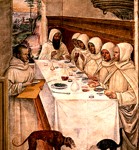[click here to view part five of this seven part series]
 Eating in Solidarity
Eating in Solidarity
Most of us spend a good bit of our waking (and even dreaming!) hours thinking about, planning, preparing and eating food. It’s one of those very mundane tasks like reading the newspaper and washing behind the ears. What we eat and how we eat don’t just determine how many pounds we will gain or lose this month; these actions deeply affect our spiritual lives.
Eating is at the heart of being a Christian. The last thing that Jesus did with his friends before he was taken away to be executed was to share a meal with them. During his three years of public ministry he had dined with quite a colorful array of folks: prostitutes and lepers, Pharisees and tax collectors, drunkards and revolutionaries.
Jesus even shared his final meal with Judas, his betrayer. It was at that last supper when Jesus took some bread and wine and said, “This is my body. This is my blood. Take and eat.” What a way to end a holy life-becoming bread for a hungry world.
What, then, does eating have to do with contemplation? Everything! To eat is to commune with God who is present in all of creation. To eat with mindfulness, with deep gratitude and joy is to praise God, our Creator. We become one with the bread we eat, one with the earth, one with God.
Unfortunately, though, eating has become a competitive sport in many First World countries. We no longer remember the origin of the milk that makes our cheese or the wheat that goes into our pizza dough. The farmers who work the land, many of them poor immigrants, are faceless in our tidy world of supermarkets and restaurant chains.
It is as though we have thrown our precious earth into a coliseum of hungry beasts who maim her and leave her, like rotting carrion, for the world’s poor to gnaw on for survival. Forty-four thousand people will die today of starvation while we build yet another fast-food restaurant.
Contemplative eating requires that we stop shoving our food down a bottomless pit and recover our spirituality of the Eucharist.
In his book Making Friends of Enemies Jim Forest tells the story of a Russian immigrant woman who found a job clearing tables in the restaurant of a gambling casino in Las Vegas. One night she returned from her work in tears and told the Franciscan sisters who had helped her find the job: “I cannot continue this work. They make me throw away the body of Jesus.” The sisters, confused, asked her to explain.
“If there is any bread left on the table, even if no one touched it, you have to throw it away…throw away the body of Jesus.” The poor immigrant woman had understood the essence of the Eucharist: all bread, all food, all of creation is, in a sense, the body of Christ.
Do our children know the consequences of our wastefulness for children of the rest of the world? Do we dare turn off the television long enough at the dinner table to pray together as a family and to recognize Christ in our breaking of the bread?
After walking along the road with the two disciples on their way to Emmaus (Luke 24:13-35), the resurrected Jesus began to continue on his way. The two disciples, confused and shaken by the events of the previous days, still had a spark of simple Christian charity in them. They invited the stranger to rest for the night before continuing his journey. He graciously accepted their kindness, and at the meal that evening he took a piece of bread, broke it, gave thanks to God and gave it to them. Eureka! The tired journey now made sense. The stranger was not a stranger after all.
Now it’s our turn, our table. Our hungry world is knocking at the door.
[click here to go to the next article in the series]
[click here to go back to the first article]
“Reprinted from’ Five Ways to Pray’, St. Anthony Messenger, copyright 2008. Used by permission of St. Anthony Messenger Press, 28 W. Liberty St., Cincinnati, OH 45202; 800-488-0488. All rights reserved.”

I have always thought the most meaningful and sacred act one can perfrom is to share a meal with a friend or friends.
After viewing, “Supersize Me” this weekend, I am brought to the same conclusion; we have trashed our food, our growers, our selves. We are abased and unappreciative of all the blessings God has showered on us. We are an ungrateful, consumer-driven society.
We need our Eucharistic meal to carry authenticity into our daily lives.